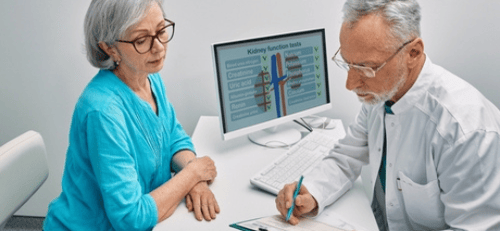Cancer is the second leading cause of death globally. But what's not widely known is that among all the different types, cancer affecting your GI tract (including the oesophagus, stomach, pancreas, small intestine, large intestine, rectum and anus) has the highest mortality rate — accounting for 38% of all deaths caused by cancer overall (lung cancer only accounts for 26%). Learn more about the different types of Gastrointestinal Cancer (GI Cancer) below.
With 4 of the 7 most common cancers being related to the digestive system and there being 2.9 million diagnoses of colorectal and stomach cancers in 2018 alone, this year's World Digestive Health Day is themed around the early diagnosis and treatment of GI cancer. In the spirit of this, we're covering what you need to know about GI cancer in Hong Kong today.
Hong Kong's Most Common Types of GI Cancer
While GI cancer has the highest mortality rate among all cancers globally, how serious is it really in Hong Kong? According to 2022's data from the Hong Kong Cancer Registry, 5 of the 10 most frequently diagnosed cancers that resulted in death in the city were associated with the GI tract.
1. Colorectal Cancer (Rank 2nd; 2,270 Deaths)
Colorectal Cancer, colon cancer (大腸癌) is Hong Kong’s most common cancer and holds an extremely high mortality rate, mostly due to late diagnosis. Over 50% of colorectal cancers are diagnosed as either stage III (cancers that have spread to lymph nodes) or stage IV (cancers that have spread to other organs). And in Hong Kong more than 50% of colorectal cancer cases are diagnosed late.
Colorectal cancer screening has the most established evidence among the different types of GI cancers screenings. Currently, most international guidelines recommend that individuals start screening at 50 years old. However, the American Cancer Society has recently lowered the starting age to 45 in recognition of the rising number of colorectal cancers being diagnosed among less than 50-year-olds in the US. This trend has also been reported in parts of Europe and Asia.
Furthermore, individuals with a family history of colorectal cancer (or advanced polyps) are at increased risk of developing this cancer. The magnitude of the risk depends on the affected family member, the age of the cancer diagnosis, and the number of relatives involved. Individuals should speak to their physicians at the appropriate time to start screening.
The primary methods of colorectal cancer screening involve testing the stool for occult blood or by endoscopy (a thin, flexible tube with a camera). Not every polyp or colorectal cancer may bleed, and not all bleeding into stool is due to cancer, so performing an endoscopy allows the doctors to directly examine the colon, remove any precancerous growths and biopsy any suspicious masses.
Endoscopy is safe, but compared to stool testing is more invasive. (One thing to note is that both screening tests are usually repeated after a certain period.)
2. Liver Cancer (Rank 3rd; 1,412 Deaths)
Liver cancer (肝癌) surveillance has also been shown to reduce deaths.
Select patients with Hepatitis B and most patients with Cirrhosis (scarring of the liver from chronic inflammation) from any cause are at risk for liver cancer. Non-alcoholic fatty liver diseases, due to obesity and high cholesterol, is becoming one of the most common causes of chronic liver disease and cirrhosis.
Some may undergo surveillance by imaging like abdominal ultrasound.
3. Pancreatic Cancer (Rank 4th; 920 Deaths)
The pancreas is a small gland located in abdomen connected to the liver and small intestine that produces enzymes to help with digestion. The majority of pancreatic cancer cases involves cancer cells affecting the part of the pancreas that produces these digestive enzymes.
Pancreatic cancer is hard to detect early, most individuals have no symptoms until the cancer has spread or become large. The American Cancer Society don't recommend screening for this cancer when individuals have no symptoms. However, endoscopic ultrasound or MRI testing can be done for people at increased or high risk from a family history of cancer.
4. Stomach Cancer (Rank 6th; 634 Deaths)
Screening for stomach cancer (or gastric cancer, 胃癌), depends on where an individual resides.
Korea and Japan have some of the highest rates of stomach cancer in the world, and therefore individuals in these countries may undergo gastric cancer screening more often and the screening test performed is usually upper endoscopy. During this test, the endoscope looks down your throat to see the lining of your oesophagus, stomach and part of the small intestine.
5. Oesophageal Cancer (Rank 10th; 286 Deaths)
Individuals with long-standing heartburn should also be mindful. Chronic acid reflux may cause inflammation and changes in the cells lining the lower part of the oesophagus, increasing the risk of oesophageal cancer (食道癌).
Furthermore, individuals finding difficulty in swallowing food should see their doctors to rule out strictures (narrowing) or more advanced problems in the oesophagus to ensure that they aren't under the risk of developing oesophageal cancer.
What are the Common Symptoms of GI Cancer?
Most GI cancers rarely show symptoms, making it one of the reasons why early diagnosis is challenging. But the signs and symptoms can include:
- A poor appetite
- A loss of weight without trying
- Abdominal (belly) pain or vague discomfort in the abdomen (usually above the navel)
- Heartburn or indigestion
- Nausea
- Vomiting (with or without blood)
- Swelling or fluid build-up in the abdomen
- Blood in stool
- Anaemia (low red blood cell count)
Many of these symptoms may not directly cause cancer, and relate to other issues such as stomach viruses or ulcers. But recurring problems that worsen should be checked immediately with your doctor as soon as possible.
What Should You do to Ensure You are Safe From GI Cancer?
In addition to adopting a healthy lifestyle with a balanced diet and regular exercise, studies have shown that screening tests help reduce the risk of developing and dying of certain types of GI cancers. These tests can identify precancerous growths earlier so patients can get treated and have a better chance of survival.
Choosing which screening test to perform requires discussing comparative benefits, risks, values and preferences between individuals and their physicians. Talk to your doctor and arrange a health check today!
 Central General Practice
Central General Practice
 Repulse Bay
Repulse Bay
 Clearwater Bay
Clearwater Bay
 BodyWorX Clinic
BodyWorX Clinic
 Central Specialist Clinic
Central Specialist Clinic
 MindWorX Clinic
MindWorX Clinic
 Partner Clinics
Partner Clinics
 Family Clinic
Family Clinic
 OT&P Annerley Midwives Clinic
OT&P Annerley Midwives Clinic
 WellWorX Clinic
WellWorX Clinic






